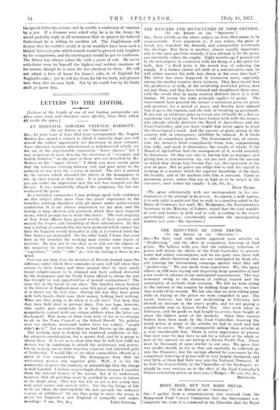THE DANGERS AND DIFFICULTIES OF FOOD CONTROL. LTD THE EDITOR
or THE "SPECTATOR.") Sta,—Your article on the above subject on June 23rd seems to be unanswerable. Your argument is: if you reduce the price of bread, you stimulate the demand, and consequently accentuate the shortage. But there is another, almost equally important, side to the same question—namely, if you attempt to fix the price, you inevitably reduce the supply. Eight months ago I pointed out in the newspapers, in connexion with the fixing of a flat price for milk, that "a fixed price is the surest way of reducing the supply. If a farmer cannot sell milk at a remunerative rate, be will either convert his milk into cheese or his cows into beef." The latter has since happened in numerous cases, especially among the smaller country dairy farmers. They have found that the production of milk, at the artificially restricted prices, does. not pay them, and they have fattened and slaughtered their eons, with the result that in many country districts there is a milk famine. Of course the same principle applies to grain. The Government have granted the farmer a minimum price for grain and potatoes, for a period of years, and thereby have induced him to go to the expense, and the risk, of breaking up grasslands. If you put an arbitrary price on bread, you virtually fix a flat, or maximum, rate for grain. You have broken faith with the farmer, who already utterly distrusts the Board of Agriculture and the Food Controller, and you have taught him never again to trust the Government's word. And tine amount of grain grown in the country will, in consequence, infallibly be reduced. It is futile to talk of compulsory powers. The Government can, of course, take the farmer's land—compulsorily—from him, compensating him fully, and work it themselves; the results of which, if the Board of Agriculture had the management of it, would certainly he disastrous. Or they can take it, leaving him as manager, and giving him as remuneration, say, ten per cent. above the amount on which they charge him Income Tax—i.e., the equivalent of the rent be pays. But no pourer can oblige him to sink his capital in farming in a manner which his superior knowledge of the•land, the locality, and of the markets tells him is unsound. Fixed or maximum prices, unless they are so high as to be unfair to the consumer, must reduce the supply.—I am, Sir, &co
HUGH MUNRO.
[We agree substantially with our correspondent in his con- demnation of the attempt to fix prices. As regards a milk famine, it is only right to point out that in reply to a question asked in the House of Commons last week, Mr. Bridgeman, the Parliamentary Secretary to the Ministry of Labour, stated that the total number of cows and heifers in milk and in calf, according to the recent agricultural canvass, considerably exceeded the corresponding number last year.—En. Spectator.]


























 Previous page
Previous page